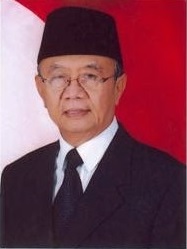
Abdurrahman Wahid, more colloquially known as Gus Dur, was an Indonesian politician and Islamic religious leader who served as the fourth president of Indonesia, from his election in 1999 until he was removed from office in 2001. A long time leader within the Nahdlatul Ulama organization, he was the founder of the National Awakening Party (PKB). He was the son of Minister of Religious Affairs Wahid Hasyim, and the grandson of Nahdatul Ulama founder Hasyim Asy'ari. Due to a visual impairment caused by glaucoma, he was blind in the left eye and partially blind in his right eye. He was the first president of Indonesia to have had physical disabilities.

The National Awakening Party, frequently abbreviated to PKB, is an Islam-based political party in Indonesia.

Presidential elections were held in Indonesia on 5 July and 20 September 2004. As no candidate won a majority in the first round, a runoff was held, in which Susilo Bambang Yudhoyono defeated Megawati Sukarnoputri and was elected president. They were the first direct presidential elections in the history of Indonesia; prior to a 2002 amendment to the Constitution of Indonesia, both the president and vice president had been elected by the People's Consultative Assembly (MPR).

Wiranto is an Indonesian politician and retired army general, who is serving as the chairman of the Presidential Advisory Council, since December 2019. Previously, he was the Commander of the Indonesian Armed Forces from February 1998 to October 1999 during Indonesia's transition from authoritarian rule to democracy, he ran unsuccessfully for President of Indonesia in 2004 and for the vice-presidency in 2009. On 27 July 2016, Wiranto was appointed Coordinating Minister for Political, Legal, and Security Affairs, replacing Luhut Binsar Panjaitan.

Nahdlatul Ulama is an Islamic organization in Indonesia. Its membership numbered over 95 million in 2021, making it the largest Islamic organization in the world. NU is also a charitable body funding schools and hospitals as well as organizing communities to help alleviate poverty.
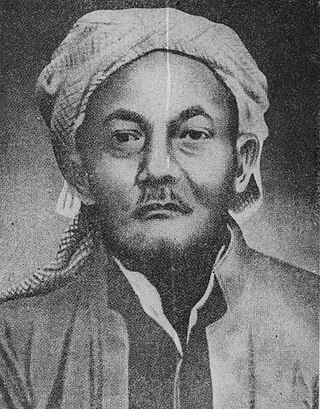
Kyai Haji Hasyim Asy'ari was an Indonesian ulama, National Hero and founder of Nahdlatul Ulama.

Abdul Wahid Hasyim was the first Minister of Religious Affairs in the government of President Sukarno of Indonesia, a post he held in 1945, and from 1949 to 1952.

Ahmad Mustofa Bisri is an Indonesian Islamic leader from Indonesia and was the ninth Chief Adviser of Nahdlatul Ulama. He is the head of Pondok Pesantren Raudlatuth Thalibin, Rembang, Central Java, Indonesia. Mustofa Bisri, well known as Gus Mus, is famous not only as a kyai—traditional Islamic teacher & leader, but also as a poet and painter.
The Ulema National Awakening Party was an Islamist political party in Indonesia. The party's main voter base was members of traditionalist Muslim organisation Nahdlatul Ulama. PKNU was established by Indonesian ulemas seeking a new political vehicle to promote Islamic political values outside the National Awakening Party.
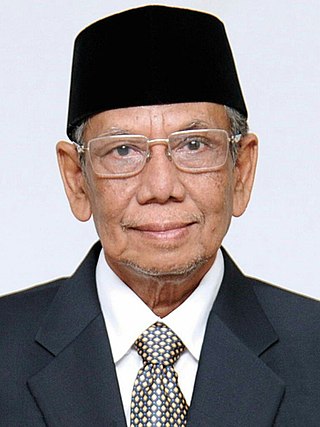
Achmad Hasyim Muzadi was an Indonesian Islamic scholar and cleric who served as chairman of the Nahdlatul Ulama, from 1999 to 2010. The founder and director of the Al-Hikam Islamic boarding school, he was a proponent of moderate Islam, which he defined as being neither radical nor liberal, and criticized both Islamic fundamentalism and Islamic liberalism. Hasyim was the vice presidential running mate of President Megawati Sukarnoputri in the 2004 Indonesian presidential election, though the ticket was defeated in a runoff. He subsequently served in the Presidential Advisory Council from 2015 until his death.
Ali Masykur Musa is an Indonesian politician who serves as current chairman of Central Board of NU's Scholars Association. He is also current member of the Supreme Audit Agency of the Republic of Indonesia and appointed as official candidate for chairman of The Working Group on Environmental Auditing, under the International Organization of Supreme Audit Institutions (INTOSAI). Ali had close relationship with former president and co-founder of National Awakening Party (PKB), Abdurrahman “Gus Dur” Wahid, and was twice elected as chairman of the party's faction in the House of Representatives in 2002 and 2006.

Abdul Muhaimin Iskandar, also colloquially known as Cak Imin or Gus Imin, is an Indonesian politician, serving as a Deputy Speaker of the People's Representative Council since 2019, and the chairman of the National Awakening Party (PKB) since 2005. Previously, he served as Deputy Speaker of the People's Representative Council from 1999 until 2009, the Minister of Manpower from 2009 until 2014, and the Deputy Speaker of the People's Consultative Assembly from 2018 until 2019. He was a vice presidential candidate in the 2024 Indonesian presidential election, as the running mate of Anies Baswedan.

Ma'ruf Amin is an Indonesian politician, Islamic cleric, and lecturer who is the 13th and current vice president of Indonesia. Aged nearly 77 years old when inaugurated, he is the oldest Indonesian vice president to ever be sworn in.

Islam is the most common religion in the Indonesian province of East Java, embraced by 96.7% of the whole population. Throughout its history, East Java has been considered one of the heartlands of Islam in Indonesia; the province experienced one of the earliest proliferations of Islam, as well as the establishment of the largest Islamic mass organization in Indonesia, Nahdlatul Ulama.

Kyai Hajj Abdul Wahab Hasbullah was a founders of the Nahdlatul Ulama movement. He also initiated the usage of newspaper for dakwah, with the establishment of the Nahdlatul Ulama newspaper, Soeara Nahdlatul Oelama. He also created the lyrics for the anthem of Nahdlatul Ulama, Ya Lal Wathon, in 1934.

Abuya Kyai Hajji Ahmad Muhtadi bin Dimyathi al-Bantani or better known as Abuya Muhtadi is an Indonesian Muslim cleric from Banten. He is known as one of the Muslim scholars close to President Joko Widodo. At the Zikir Kebangsaan which was first held by the Indonesian government in the Merdeka Palace in 2017, Muhtadi was one of the religious leaders invited by the president. In the 2019 Indonesian presidential election, he supported a friend who was also a Muslim cleric from Banten, Ma'ruf Amin, who became the running mate of incumbent presidential candidate, Joko Widodo. Even so, in the 2014 Indonesian presidential election, he supported Prabowo Subianto as a candidate for Indonesian President and instructed his students to vote for Subianto.
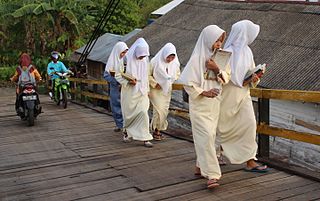
Kota santri is an epithet used in Indonesia, predominantly in Java, given to a region historically important in the context of Islamic education. The term santri generally means a Muslim student who studies at pesantren, an Islamic boarding school indigenous to the Indonesian archipelago.

Kyai Haji Yahya Cholil Staquf, nicknamed Gus Yahya, is an Indonesian politician and Islamic cleric who has served as the chairman of the Executive Council of Nahdlatul Ulama (NU) since December 2021. In the election of the 34th NU Conference at Lampung University, Bandar Lampung on 24 December 2021, Gus Yahya beat the incumbent Said Aqil Siradj, with the former gaining 337 votes and the latter 210 votes. He served as spokesperson of Abdurrahman Wahid from 1999 to 2001. On 31 May 2018, he was appointed as member of Presidential Advisory Council replacing Hasyim Muzadi by President Joko Widodo. Yahya is a former member of National Awakening Party (PKB).

Taufikurrahman Saleh was an Indonesian politician and lawyer who served as a member of the People's Representative Council representing the constituency of East Java IX from 1999 until 2009. He previously served as a member of the Surabaya city council and the East Java provincial assembly.
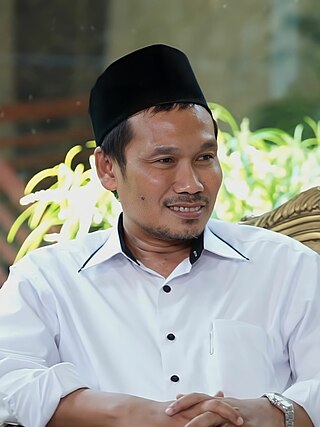
Ahmad Bahauddin Nursalim or better known as Gus Baha is a cleric from Rembang Regency, Central Java, who specializes in interpreting the quran.
